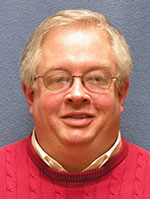Reflection / Sean Gallagher
Ancient hymns keep the light of Christian culture shining
 Though Venantius Fortunatus was part of a dying breed of classic Roman poets in the mid-sixth century, his work lives on today, especially during Holy Week.
Though Venantius Fortunatus was part of a dying breed of classic Roman poets in the mid-sixth century, his work lives on today, especially during Holy Week.
Schooled well in the works of classic Roman poets who lived 500 or more years before him, as well as later Christian Roman poets, Fortunatus sought to carry on in his works the blending of the glory of Rome and the beauty of the Gospel.
Fortunatus, the bishop of Poitiers in what is now central France in the mid-500s, didn’t write his poems for the dwindling number of cultured Romans of his time. His audience were Frankish nobles, who had taken over the region after the collapse of the western Roman empire in the late fifth century and who had become Christian only about 50 years prior.
In 552, the Frankish queen Radegunda founded in Poitiers the Monastery of the Holy Cross for nuns. The Byzantine Emperor Justin II gave the monastery a relic of the true cross in 569. Fortunatus was then commissioned to write Latin poems for the arrival of the relic.
One of them, “Pange lingua gloriosi proelium certaminis” (“Sing, my tongue, of the glorious struggle”) inspired
St. Thomas Aquinas some 700 years later to compose “Pangue lingua gloriosi corporis mysterium” (“Sing, my tongue, of the Savior’s glory”). St. Thomas’ hymn is often sung on Holy Thursday. Two verses of it are also traditionally sung in exposition of the Blessed Sacrament and in Benediction.
Another poem was “Vexilla regis prodeunt.” A beautiful English translation of it with the title “The Royal Banners Forward Go” was made by the 19th-century Anglican clergyman John Mason Neale. The Benedictine monks of Saint Meinrad Archabbey in
St. Meinrad have recorded some verses of this hymn. It can be heard here: cutt.ly/RoyalBanners.
It is often sung with Neale’s translation or others in Holy Week and on the feast of the Exaltation of the Holy Cross on Sept. 14.
In composing such beautiful poetry for worship, Fortunatus sought to keep the light of Christian civilization burning as a cultural darkness threatened to envelop the lands of the former western Roman Empire.
Thankfully, he, a handful of other similar poets and the spreading of Benedictine monasteries in lands ruled then by newly converted Germanic tribes were successful in their mission.
They helped these new Christians form cultures rooted in the Gospel. While they also had strands of classic Roman civilization in them, they developed their own distinct identities that would eventually make up the diverse constellation of European culture, which began to be brought to North America 1,000 years after Fortunatus.
His contributions continue to be experienced today by myself, my four younger sons and their fellow students at Lumen Christi Catholic School in Indianapolis as we and other Massgoers chant “The Royal Banners Forward Go” during daily Mass in the final two weeks of Lent at Our Lady of the Most Holy Rosary Church.
Making this spiritual patrimony a living part of the faith of Catholics today is a mission similar to that of Fortunatus 1,500 years ago.
The Christian cultures of Europe that Fortunatus helped lay the foundation stones for—and which have spread around the world—are threatened now with a darkness that he faced in his time.
The secularism of today is similar in some ways with ancient paganism—both Roman and Germanic. Both are marked by the ethic that might makes right and by a definition of what it means to be human that is changeable for the convenience of the powerful.
The Gospel, which finds its culmination in Christ’s death on the cross and his resurrection, brought a mercy available to all to the center of culture and society.
Let us as Catholics do much to keep the light of this culture burning, including by making our ancient spiritual and liturgical treasures a living part of the Church today.
(Sean Gallagher is a reporter and columnist for The Criterion.) †
 Though Venantius Fortunatus was part of a dying breed of classic Roman poets in the mid-sixth century, his work lives on today, especially during Holy Week.
Though Venantius Fortunatus was part of a dying breed of classic Roman poets in the mid-sixth century, his work lives on today, especially during Holy Week.